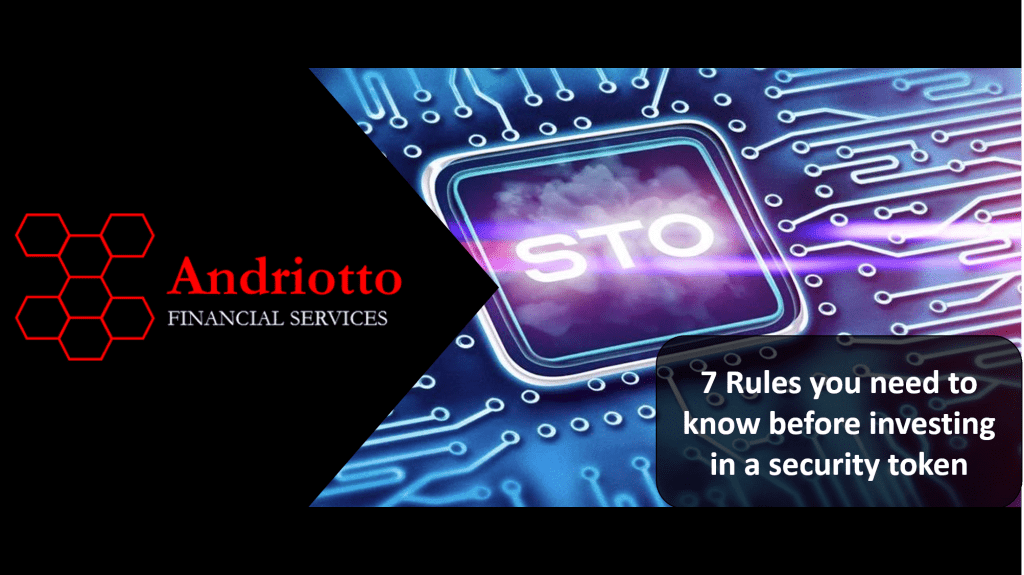Understanding the 7 rules for crypto is key to being successful in token investments and trading. It requires rules and discipline to follow them. Side or background features often distract people, and they forget that it all boils down to a cool-headed analysis of the pros and cons for any investment. There are actually many rules as the devil is in the details, but here we shall focus on the seven which we consider most important.
Rule 1: Regulation
These are securities, which means that they are regulated. Before considering an investment you should ascertain which one is the regulatory authority and the jurisdiction. This is very important in order to determine the applicable law and regulations as well as the compliance requirements. Switzerland has acted fast to develop the legal framework for blockchain-based structs such as tokens, smart contracts and coins. The canton of Ticino has gone as far as to register companies with their securities certificated by reference to tokens. Most EU jurisdictions must test the legal validity of referencing and negotiating securities through transfer of tokens.
Rule 2: Eligibility
Given the jurisdiction of the token and your domicile, residence, tax status, and investor status as accredited professional or regular non-professional, you should check your eligibility for acquiring and holding the token. Economies like the US, EU member states, and Japan often restrict offering shares and tokens to non-professional investors through legislation. The laws in developed nations frequently limit securities offerings only to accredited professional investors. You must understand the regulations in your location regarding participating as an investor for any given security token.
Rule 3: Offering Document / Prospectus
Being a security such as a token implies that there should be an offering document. This is a prospectus containing all essential information to judge the value, return, and risk of the offered security. For smaller issues to accredited investors, a full prospectus may not be compulsory. However, some type of offering document should always be present. The prospectus requirement exists so investors have the information needed to evaluate the security. Starting from 2020, the EU and Swiss legislation in this respect is harmonized. This means that Switzerland adheres to the EU framework for securities offerings. The US has its own regulations which differ from the EU and Switzerland. One should be very careful even when documents such as prospectuses fall into the hands of US citizens and residents due to differences in securities laws.
Rule 4: Risk-Return Profile
In order to assess the rationale of investing in a security token, you should assess the risk and return profile of the underlying security. If the underlying is equity, its free cash flows, volatility and uncertainty ultimately determine the risk and return profile. Equity value is based on these factors. For bonds, the key factors are the likelihood of repayment as scheduled and the interest rate as compensation for time delay and risk of default. Evaluating bonds focuses on these bond specifics like repayment and interest rate. Properly assessing security tokens requires analyzing the risk and return attributes of what the token represents.
Rule 5: Tax Status
Before investing in a STO you should have a clear idea what the tax effects of income and capital gains from the token will be. Alternative ways of structuring the return should be explored. Tokens that do not offer dividends but capital gains are more democratic as it is your choice when to cash out and realize a capital gain.
Rule 6: Technology
In order to invest in tokens a minimum understanding of technology is required. For example you should use the right wallet for storing the tokens. The platform must approve this wallet in compliance with KYC requirements. Technology and how secondary markets are organized also determine liquidity.
Rule 7: People
Finally as with all stocks and companies it all boils down to people and how they work together to make things happen. This is especially true for SMEs, startups and high-growth projects, which are the usual candidates for STOs. Besides the people standing behind the token, an investor should also consider the people behind the token exchange platform, the market-making, the whole club of investors that has formed. Cultural fit is essential as it impacts all you need from announcements and disclosure of information to the most trivial peer support.
At AFS, we are passionate about fostering innovation and empowering ambitious minds to flourish. Our mission is to provide best-in-class financial services for traditional and crypto deals, exploit European grants, and use quantitative methods to improve clients’ performance. We aim to help our customers unlock their full business potential.
Are you looking to fund your next venture or unlock grant opportunities?
Contact us at [email protected]!




